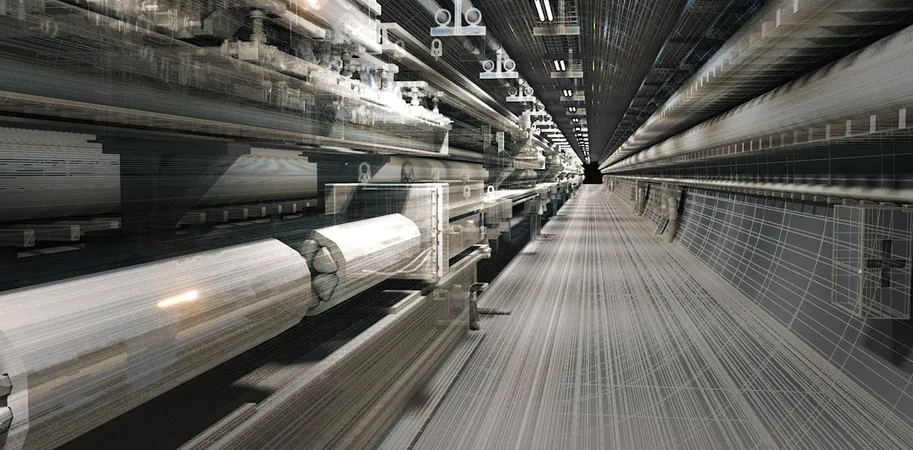
Unveiling the Future: Why Billions Are at Stake for a 70-Year Scientific Odyssey Beneath the Swiss Alps
2025-04-17
Author: Benjamin
A Game-Changer in Particle Physics
The Large Hadron Collider (LHC) has made waves in the world of science, leading to groundbreaking discoveries like the enigmatic Higgs boson and opening doors to new particles and potential forces of nature. Situated at CERN, straddling the border between France and Switzerland, this colossal machine is set to operate for another 15 years. But the scientific community is already turning its gaze to the future.
The Ambitious Future Circular Collider Project
Enter the Future Circular Collider (FCC), a bold proposal that could reshape our understanding of the universe over a staggering 70-year timeline. Imagine a machine three times larger than the LHC, housed within a massive 91-kilometer tunnel winding through the majestic Alps and Jura mountains. This behemoth promises to tackle some of the biggest enigmas of the cosmos while potentially unveiling new mysteries.
Unlocking the Secrets of the Universe
The FCC's two-stage plan is nothing short of revolutionary. The first phase involves a collider designed for electrons and positrons, facilitating detailed examinations of the Higgs boson. The second phase will elevate the energy levels of proton collisions to an unprecedented seven times their current capacity, paving the way for the discovery of previously unseen particles.
The Quest Beyond the Standard Model
While the LHC's spotlight shone brightly on the Higgs boson, gaps remain within our favored Standard Model of particle physics. The FCC intends to probe these uncharted territories, addressing questions such as: What gives mass to lighter particles? Does the Higgs field also influence the mass of the Higgs boson? Moreover, this ambitious project will explore the interactions of heavy quarks to unravel the mystery of why our universe is predominantly matter rather than antimatter.
A Competitive Global Landscape
CERN isn't the only player in the race for groundbreaking discoveries. Competing projects include Japan's proposed 20-kilometer International Linear Collider and China's ambitious 100-kilometer Electron Positron Collider (CEPC). As these countries advance their own initiatives, the stakes for the FCC's approval have never been higher.
The High Price of Discovery
Yet, such enormous undertakings come with hefty price tags. The first stage of the FCC alone is estimated to cost about 15 billion Swiss francs (around $18 billion), with one-third allocated for tunnel construction. Even so, proponents argue that up to 80% of these costs can be absorbed by CERN's existing budget. The second stage could inflate this figure to 19 billion Swiss francs, emphasizing the long-term commitment required for such groundbreaking scientific endeavors.
Beyond the Science: Societal Benefits
Historically, projects like the LHC have yielded far-reaching technological advancements beyond particle physics. From innovations in medical technology to open-source software, the benefits have permeated various sectors. For instance, Medipix chips, originally developed for LHC detectors, are now integral to medical imaging and material science.
A Legacy of Collaboration and Curiosity
For 70 years, CERN has stood as a beacon of international cooperation, proving that nations can unite to push the boundaries of knowledge. The construction of the FCC promises not only to enhance our scientific understanding but to solidify humanity's collective pursuit of knowledge and innovation in an increasingly complex world.









 Brasil (PT)
Brasil (PT)
 Canada (EN)
Canada (EN)
 Chile (ES)
Chile (ES)
 Česko (CS)
Česko (CS)
 대한민국 (KO)
대한민국 (KO)
 España (ES)
España (ES)
 France (FR)
France (FR)
 Hong Kong (EN)
Hong Kong (EN)
 Italia (IT)
Italia (IT)
 日本 (JA)
日本 (JA)
 Magyarország (HU)
Magyarország (HU)
 Norge (NO)
Norge (NO)
 Polska (PL)
Polska (PL)
 Schweiz (DE)
Schweiz (DE)
 Singapore (EN)
Singapore (EN)
 Sverige (SV)
Sverige (SV)
 Suomi (FI)
Suomi (FI)
 Türkiye (TR)
Türkiye (TR)
 الإمارات العربية المتحدة (AR)
الإمارات العربية المتحدة (AR)